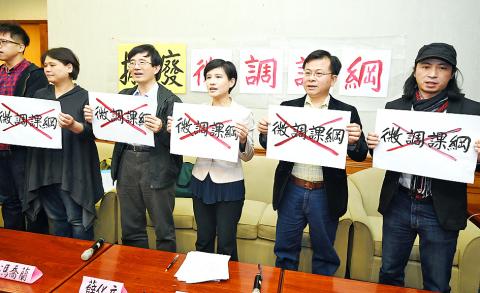President-elect Tsai Ing-wen (蔡英文) should set a timeline for and clarify the contents of planned changes to controversial high-school curriculum guidelines, as schools begin their textbook selection processes, civic groups said yesterday, adding that chaos could erupt if changes are announced after Tsai takes office on May 20.
Taiwan Grassroots Education Alliance member Chang Wen-lung (張文隆), a history teacher at New Taipei City Municipal San Min High School, said that Tsai should promise to withdraw the guidelines as soon as she is sworn in on May 20 to clear up possible confusion about her intentions.
“People have serious doubts about the educational policy of the new administration,” Chang said. “[Tsai’s] rhetoric has always been vague, saying that she would address the matter after the presidential election, so if she does not state her stance clearly, it would be unclear what she is hesitating over.”

Photo: Liao Chen-huei, Taipei Times
While Tsai has promised to withdraw the high-school social studies guidelines implemented last year, it is unclear whether the Chinese language and geography portions of the guidelines would be included along with history and civics, Chang said, adding that a timeline for the withdrawal is also unclear.
“We have no idea how long it would take to address history and civics, but if Tsai waits until after textbooks have been chosen and contracts have been signed, continued usage of the guidelines next year would be unavoidable,” he said, adding that while schools have some flexibility over when they choose textbooks, most decisions are made in April and May to allow paperwork to be processed before the summer break.
The Ministry of Education has allowed schools to choose textbooks based on both the old and new sets of guidelines, following controversy over what critics called “China-centric” revisions.
Cheng Chi-jui (鄭啟瑞), a history teacher at New Taipei Municipal Taishan Senior High School, said the continued use of both sets of guidelines doubled the burden of teaching graduates preparing for official exams.
“In addition to familiarizing themselves with the different textbook versions, [teaching graduates] must also keep track of which textbooks are based on the ‘old’ and ‘new’ guidelines, effectively doubling their workload,” he said.
Democratic Progressive Party Legislator Cheng Li-chun (鄭麗君) said that while her motion to order the withdrawal of the guidelines had garnered 65 signatures — more than a majority of national legislators — the Chinese Nationalist Party (KMT) used parliamentary procedures to delay a formal vote until next month by exercising its right to demand “cross-caucus negotiations.”
Cheng called for the ministry to immediately withdraw the guidelines on its own initiative, blasting ministry statements that any withdrawal would leave schools without direction.
The Chinese language and social studies components of curriculum guidelines were withdrawn after President Ma Ying-jeou (馬英九) took power in 2008, with the ministry simply ordering schools to follow an earlier set of guidelines, Cheng said.

CHAOS: Iranians took to the streets playing celebratory music after reports of Khamenei’s death on Saturday, while mourners also gathered in Tehran yesterday Iranian Supreme Leader Ayatollah Ali Khamenei was killed in a major attack on Iran launched by Israel and the US, throwing the future of the Islamic republic into doubt and raising the risk of regional instability. Iranian state television and the state-run IRNA news agency announced the 86-year-old’s death early yesterday. US President Donald Trump said it gave Iranians their “greatest chance” to “take back” their country. The announcements came after a joint US and Israeli aerial bombardment that targeted Iranian military and governmental sites. Trump said the “heavy and pinpoint bombing” would continue through the week or as long

TRUST: The KMT said it respected the US’ timing and considerations, and hoped it would continue to honor its commitments to helping Taiwan bolster its defenses and deterrence US President Donald Trump is delaying a multibillion-dollar arms sale to Taiwan to ensure his visit to Beijing is successful, a New York Times report said. The weapons sales package has stalled in the US Department of State, the report said, citing US officials it did not identify. The White House has told agencies not to push forward ahead of Trump’s meeting with Chinese President Xi Jinping (習近平), it said. The two last month held a phone call to discuss trade and geopolitical flashpoints ahead of the summit. Xi raised the Taiwan issue and urged the US to handle arms sales to

State-run CPC Corp, Taiwan (CPC, 台灣中油) yesterday said that it had confirmed on Saturday night with its liquefied natural gas (LNG) and crude oil suppliers that shipments are proceeding as scheduled and that domestic supplies remain unaffected. The CPC yesterday announced the gasoline and diesel prices will rise by NT$0.2 and NT$0.4 per liter, respectively, starting Monday, citing Middle East tensions and blizzards in the eastern United States. CPC also iterated it has been reducing the proportion of crude oil imports from the Middle East and diversifying its supply sources in the past few years in response to geopolitical risks, expanding

Pro-democracy media tycoon Jimmy Lai’s (黎智英) fraud conviction and prison sentence were yesterday overturned by a Hong Kong court, in a surprise legal decision that comes soon after Lai was jailed for 20 years on a separate national security charge. Judges Jeremy Poon (潘兆初), Anthea Pang (彭寶琴) and Derek Pang (彭偉昌) said in the judgement that they allowed the appeal from Lai, and another defendant in the case, to proceed, as a lower court judge had “erred.” “The Court of Appeal gave them leave to appeal against their conviction, allowed their appeals, quashed the convictions and set aside the sentences,” the judges